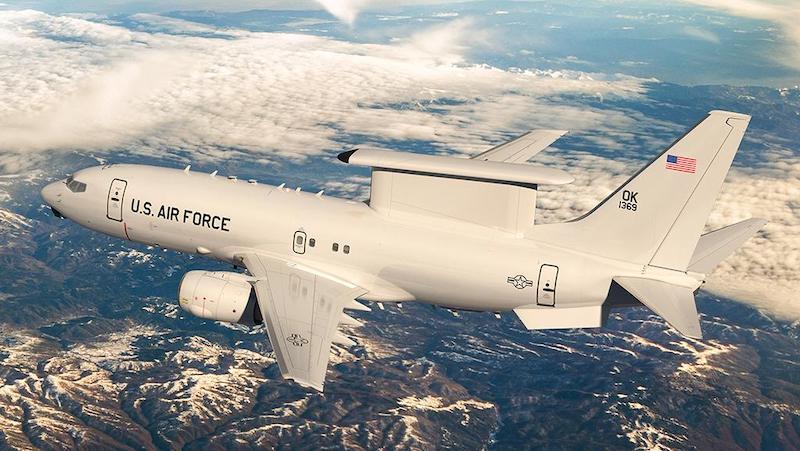
A rendering of a U.S. Air Force E-7A Wedgetail.
LONDON—Boeing Defense and Space has been known for years for building its development portfolio by bidding low to win, leading to extensive cost overruns as the programs progress.
Under CEO Ted Colbert, the company is trying to change its approach by being more strict about the programs it chases and looking to be more realistic in its bids.
This process played out over the past several months for the OEM’s E-7A Wedgetail program for the U.S. Air Force, which began with some challenges. But it was announced this week that the two sides have agreed to costs following extensive negotiations and public jabs from the service.
“We’ve gone through a negotiation process with them that began a little challenged,” Colbert said July 21 ahead of the Farnborough Airshow. “We had a challenge because we had a disconnect between the requirements, the pricing and cost. We needed to just get into a room and be very transparent with one another about going forward. That process actually worked.”
Air Force Secretary Frank Kendall announced July 20 that the two sides agreed on costs for the two prototypes for the program, after the service brought in a former official to negotiate directly with Boeing. The service first said in February that an unexpected cost estimate by Boeing, which pegged nonrecurring engineering at double what was originally expected, prompted a disagreement.
Andrew Hunter, the service’s assistant secretary for acquisition, said Boeing agreed to reduce its costs in part because the follow-on production demand for the E-7A would allow it to recoup the funding. The Air Force plans to buy 26 of the 737-based aircraft, with additional international demand expected. NATO is looking to buy six of the type, and Boeing is considering other nations for potential sales, including Canada. The manufacturer is also building three aircraft for the UK.
Colbert said Boeing provided feedback on the negotiation process to the Pentagon, which was surprised that the company approved of it and would look for similar negotiations in the future.
“Because it allows us to get to ground truth on the capability being requested, for the requirements and the real price and cost back in the supply chain that we put on the table,” Colbert told reporters ahead of Farnborough.
Following the fixed-price development issues on the T-7 and KC-46, Colbert said Boeing is focusing going forward on “starting programs right.”
“This is an example of doing exactly that—by having a conversation with the customer, having transparency around our costs through the supply chain, getting to a place that negotiates in a way that’s compliant and sets us up from a healthy business perspective to perform well going forward,” he said.
To obtain financial stability, Colbert said Boeing needs to maintain an approach based in transparency and having “reality-based assumptions” for the work.
